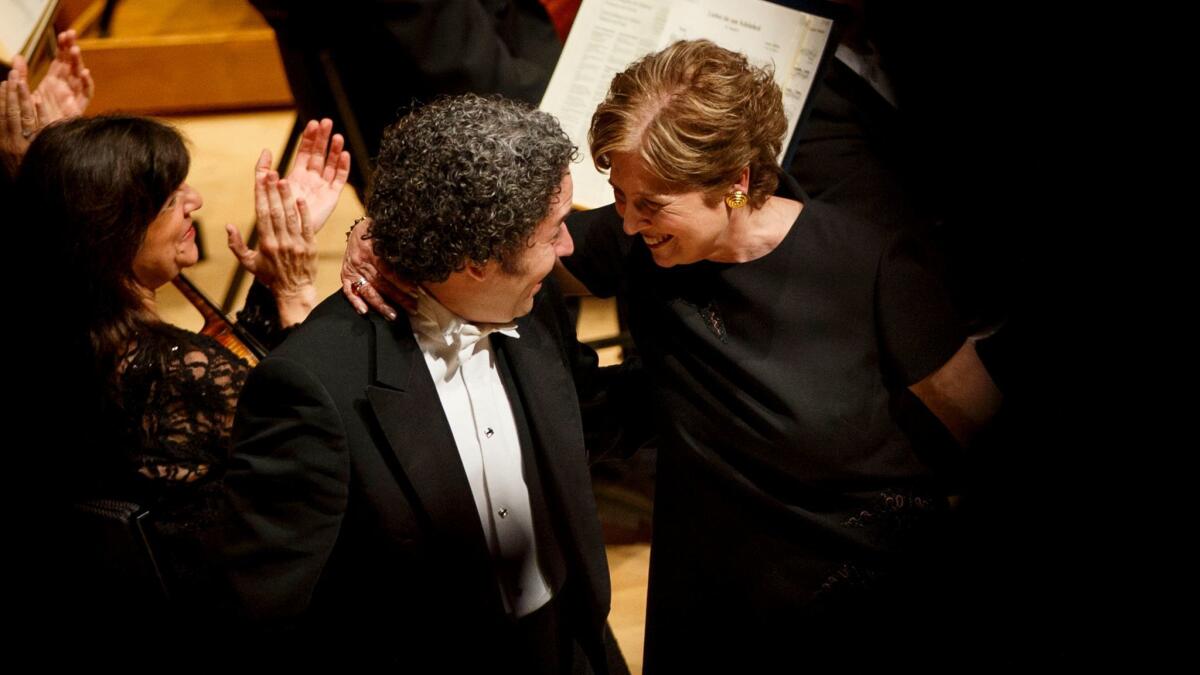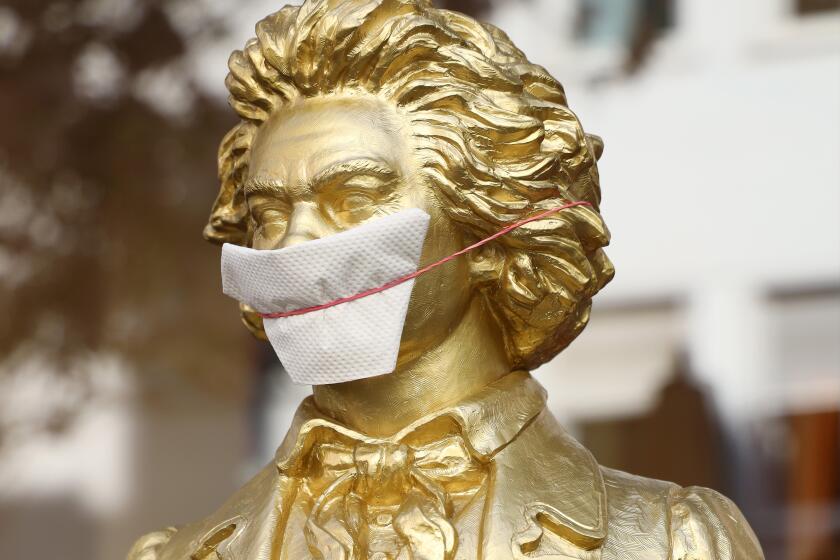For American orchestras, survival lessons from the woman who rescued the L.A. Phil

Three years ago, Deborah Borda left the Los Angeles Philharmonic, which she had run for 17 years, to take on the problems of the troubled New York Philharmonic. The country’s oldest major orchestra was financially shaky, had appointed a new music director in Jaap van Zweden who had yet to generate enthusiasm from the press and public, had bungled one proposed concert hall renovation after another for years, and had struggled to maintain relevance in New York cultural life.
She‘d had similar problems at the L.A. Phil and handled them in such a way that it became arguably the world’s most admired orchestra. Turning around the New York Philharmonic would then be the capstone of her career. But little could Borda have known that, while having made remarkable strides in less than three New York seasons, her role would suddenly be to save the New York Philharmonic, and possibly by her example help to save other American orchestras.
“What a tragedy for us is that the thing that we do, which is live concerts and reaching people, we can’t do,” Borda said last week in a video conversation from her New York apartment, as the novel coronavirus poses a novel existential threat to orchestra life.
“This is like the Nazis about to invade England,” she said. “We’re overwhelmed because we don’t know what to do. We don’t have the information we need to make the right kinds of decisions to look at the way forward. But we’re putting it together. We’ve got to do the best we can to help people out.”
Characteristically, Borda has been leading the charge. She felt very uneasy at the New York Philharmonic’s March 10 concert, so she called off the next morning’s rehearsal and got in touch with leaders at the Metropolitan Opera, Carnegie Hall and Lincoln Center, convincing them that it was no longer safe for any of them to remain open.
Though rebuffed by a City Hall under pressure from commercial interests to keep Broadway’s lights on, she coordinated with her colleagues to announce at 12:45 p.m. on March 12 that they were canceling all events for two weeks. Shortly afterward, New York Gov. Andrew Cuomo closed all theaters.
Eleven days later, Borda again led the way for American orchestras by canceling the remainder of the New York Philharmonic season, thus making it easier for others to take the inevitable step.
“There’s no playbook,” Borda confessed, but she also realized what she needed to do in New York was the same kind of cooperation between institutions she had developed in L.A.
“In L.A., we all worked together,” she explained. “We were all friends.
“I knew Michael [Govan, head of the Los Angeles County Museum of Art] really well and Annie [Philbin, head of the Hammer Museum] and Stephen Rountree [then-president of the Music Center]. I have to say it’s not been that way so much here. But now we’re all talking together.”
She said she is in regular contact with Chad Smith, her former No. 2 at the L.A. Phil and now its president and chief executive, as well as with artistic and music director Gustavo Dudamel, Walt Disney Concert Hall architect Frank Gehry and conductor laureate Esa-Pekka Salonen (who is isolating in Finland). She also stays in close touch with orchestra managers around the county, many of whom she has mentored.
The week’s arts news in one newsletter, including one man’s obsession with L.A. museums, a towering propaganda painting and more pandemic effects.
Even so, Borda is the first to admit that she doesn’t have answers about how or when concerts can begin again. She has no crystal ball about what life will be like in the wake of the coronavirus. She also knows that it is imperative to be honest about the situation.
“The next couple of months,” she confessed, “are very unknown. But times of this kind of catastrophe are times for really reimagining what you can do and bringing people along to dare to make those choices.”
Borda conceded at the moment she doesn’t dare to go outside, but beyond that she recounted how she dared when she came to L.A. in 2000. The L.A. Phil had a deficit in the neighborhood of $16 million and barely no endowment, meaning its finances were even more precarious than the New York Philharmonic’s in 2017.
Her philosophy, however, is that the way to raise money is by investing in the future, so that you have something people really want to support. Disney Hall was under construction. She sensed that Salonen’s progressive vision, though still controversial, would pave the way for the L.A. Phil to become the orchestra of the future.
Glenn Gould’s “Solitude Trilogy” uses dialogue as though it were musical counterpoint and explores a kind of isolation familiar in our coronavirus era.
When asked about this, Borda described a dinner she had with the philanthropist Richard Colburn.
“I had only been in L.A. a couple of weeks when he offered to give me a very large, multimillion-dollar donation for the endowment, but he said he wouldn’t give anything for the hall,” Borda said. “He thought the Dorothy Chandler Pavilion was already great.
“I said, ‘Well, Richard, you can keep your money. We need to build the hall, because that’s the only path forward for the orchestra.’ He said, ‘No.’ But in the end he gave to the hall and loved going. He had those front-row seats, and he was there something like four times a week.”
In the same way, Borda insisted that the renovation of the New York Philharmonic’s long unloved David Geffen Hall must continue despite the $200 million still be raised for the $550 million project.
“What we need to think about in the midst of whatever the smoke and ashes are around us,” she said, “there will be a future, but only if we can invent that and what it’s going to look like. For me, the renovation of the hall is critical, because it’s the future.
“It’s going to be a massive construction site, and just think of all the jobs it will create. After it’s open, there are going to be restaurants and welcome centers. All the artistic stuff aside, it makes economic sense.”
Borda does not see a way for programs to be given anywhere this summer, although many, such as those at the Hollywood Bowl, have not yet been officially canceled.
“The big decision is what happens after the summer,” she said. “I don’t have an answer. The first thing is going to be the safety of the orchestra, staff and public. The second is economics, which is also stunning.”
As all orchestras must, Borda has made different models for how things could turn out, but the losses will inevitably reach tens of millions of dollars.
For her, public events are out of the question until testing can protect the orchestra onstage and the ushers interacting with the public. Social distancing is impossible onstage or in the audience, so patrons must be certain that it is safe to return. When they do, Borda said, it will be special.
She, of course, knows something about the meaning of momentous concerts, having engineered the triumphant opening of Disney Hall in 2003 and Dudamel’s first concert there as music director in 2009. Both played an incalculable part in making the L.A. Phil the enormous success it is today, and the culture of Los Angeles being what it is.
“I say to the orchestra,” Borda avowed, her eyes lighting up enough that the effect registered even on screen, “just imagine the day when we all come together again, the first moment you’re onstage and the staff and everyone is there and you start to play, and then we have a concert.
“That will be magic. That will be something we will never forget for the rest of our lives. We’ve got to keep that in our mind’s eye. We’ll get there. We don’t know when, but I think about it all the time and how I’ll cry and get all choked up.
“It will happen. It will happen.”
The last thing we need is another Beethoven’s Fifth Symphony — unless Teodor Currentzis is conducting. His new recording brings much-needed catharsis.
More to Read
The biggest entertainment stories
Get our big stories about Hollywood, film, television, music, arts, culture and more right in your inbox as soon as they publish.
You may occasionally receive promotional content from the Los Angeles Times.














